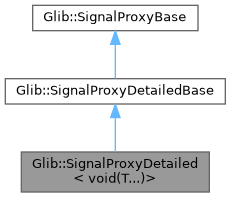Proxy for signals with any number of arguments and possibly a detailed name. More...
#include <glibmm/signalproxy.h>
Inheritance diagram for Glib::SignalProxyDetailed< void(T...)>:

Public Types | |
| using | SlotType = sigc::slot< void(T...)> |
Public Member Functions | |
| SignalProxyDetailed (ObjectBase *obj, const SignalProxyInfo *info, const Glib::ustring &detail_name) | |
| sigc::connection | connect (const SlotType &slot, bool after=true) |
| Connects a signal handler to a signal. | |
| sigc::connection | connect (SlotType &&slot, bool after=true) |
| Connects a signal handler to a signal. | |
 Public Member Functions inherited from Glib::SignalProxyDetailedBase Public Member Functions inherited from Glib::SignalProxyDetailedBase | |
| ~SignalProxyDetailedBase () noexcept | |
| void | emission_stop () |
| Stops the current signal emission (not in libsigc++) | |
 Public Member Functions inherited from Glib::SignalProxyBase Public Member Functions inherited from Glib::SignalProxyBase | |
| SignalProxyBase (Glib::ObjectBase *obj) | |
Additional Inherited Members | |
 Protected Member Functions inherited from Glib::SignalProxyDetailedBase Protected Member Functions inherited from Glib::SignalProxyDetailedBase | |
| SignalProxyDetailedBase (Glib::ObjectBase *obj, const SignalProxyInfo *info, const Glib::ustring &detail_name) | |
| Creates a proxy for a signal that can be emitted by obj. | |
| sigc::slot_base & | connect_impl_ (bool notify, const sigc::slot_base &slot, bool after) |
| Connects a signal handler to a signal. | |
| sigc::slot_base & | connect_impl_ (bool notify, sigc::slot_base &&slot, bool after) |
| Connects a signal handler to a signal. | |
 Protected Attributes inherited from Glib::SignalProxyBase Protected Attributes inherited from Glib::SignalProxyBase | |
| ObjectBase * | obj_ |
Detailed Description
template<class... T>
class Glib::SignalProxyDetailed< void(T...)>
class Glib::SignalProxyDetailed< void(T...)>
Proxy for signals with any number of arguments and possibly a detailed name.
Use the connect() method, with sigc::mem_fun() or sigc::ptr_fun() to connect signal handlers to signals.
This is a specialization for signal handlers that return void.
Member Typedef Documentation
◆ SlotType
template <class... T>
| using Glib::SignalProxyDetailed< void(T...)>::SlotType = sigc::slot<void(T...)> |
Constructor & Destructor Documentation
◆ SignalProxyDetailed()
template <class... T>
|
inline |
Member Function Documentation
◆ connect() [1/2]
template <class... T>
|
inline |
Connects a signal handler to a signal.
For instance, connect( sigc::mem_fun(*this, &TheClass::on_something) );
By default, the signal handler will be called after the default signal handler. This is usually fine for signal handlers that don't return a value.
- Parameters
-
slot The signal handler, usually created with sigc::mem_fun() or sigc::ptr_fun(). after Whether this signal handler should be called before or after the default signal handler.
- Returns
- A sigc::connection.